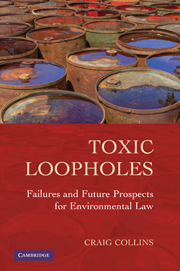Book contents
- Frontmatter
- Contents
- Dedication
- Introduction: Crime Without Punishment
- 1 The EPA – Policing or Protecting Polluters?
- 2 The Clean Air Act – Gasping for Breath
- 3 The Clean Water Act – Up Sh*t Creek
- 4 Superfund and RCRA – Toxic Trash
- 5 TSCA – The Toothless Tiger
- 6 The Endangered Species Act – Noah's Ark or Titanic?
- 7 Planetary Problems – Cooperation or Collapse?
- Conclusion: A Glimmer of Hope
- Bibliography
- Index
6 - The Endangered Species Act – Noah's Ark or Titanic?
Published online by Cambridge University Press: 05 June 2012
- Frontmatter
- Contents
- Dedication
- Introduction: Crime Without Punishment
- 1 The EPA – Policing or Protecting Polluters?
- 2 The Clean Air Act – Gasping for Breath
- 3 The Clean Water Act – Up Sh*t Creek
- 4 Superfund and RCRA – Toxic Trash
- 5 TSCA – The Toothless Tiger
- 6 The Endangered Species Act – Noah's Ark or Titanic?
- 7 Planetary Problems – Cooperation or Collapse?
- Conclusion: A Glimmer of Hope
- Bibliography
- Index
Summary
Without biodiversity, humans would perish. Biodiversity, or biological diversity, is succinctly defined as the entire, interdependent web life on Earth. The Rutgers University Biodiversity Initiative defines it more thoroughly as:
…the sum total of all the plants, animals (including humans), fungi and microorganisms, along with their individual variations and the interactions between them. It is the set of living organisms and their genetic basis that make up the fabric of the planet earth and allow it to function as it does, by capturing energy from the sun and using it to drive all of life's processes.
This complex web of life is humanity's life support system. It provides us with food, clothing, medicine, shelter and even the air we breathe; it regulates our climate and purifies our water; it recycles our wastes, keeps our soil fertile and our crops pollinated. In addition, biodiversity is the storehouse for the genetic heritage of millions of years of evolution.
Today this web of life is being shredded. Many of the creatures that make up this network are going extinct. Should humans be concerned? The renowned ecologist, Paul Ehrlich, used the following metaphor: If you noticed someone popping rivets out of an airplane you were about to board, would you be alarmed? What if the person assured you that a few rivets would not make any difference? You might be persuaded, but at what point would you insist that the rivet popper stop?
- Type
- Chapter
- Information
- Toxic LoopholesFailures and Future Prospects for Environmental Law, pp. 125 - 144Publisher: Cambridge University PressPrint publication year: 2010



